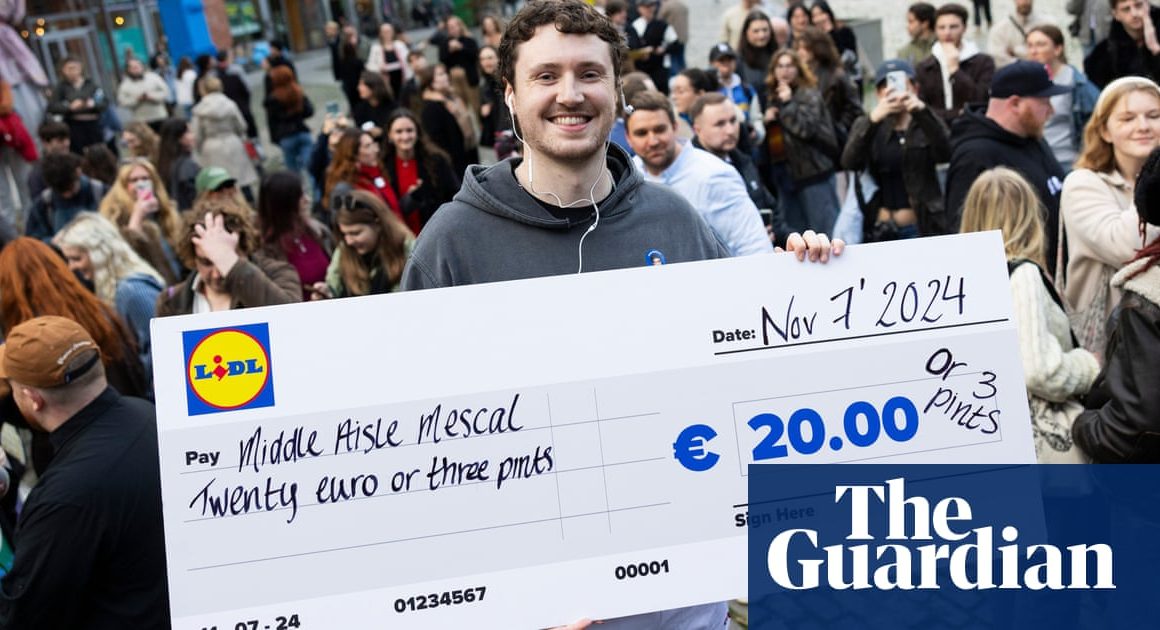Opening summary
Hello and welcome to the Guardian’s live coverage of the Israel-Gaza war.
Israeli forces have withdrawn from the occupied West Bank city of Jenin, the Palestinian news agency Wafa is reporting, after a 10-day raid in which 21 people were killed according to the Palestinian health ministry.
A Reuters witness said the Israeli forces left behind extensive damage to infrastructure.
In a statement on Facebook, the Palestinian foreign ministry accused Israel of transferring to the occupied West Bank its brutal destruction and devastation in the Gaza Strip, as evidenced by the situation in the cities of Jenin and Tulkarm, and the refugee camps there.
Israeli raids elsewhere in the West Bank continued, Al Jazeera reported, including in the village of Husan, west of Bethlehem, where a 20-year-old woman was injured by shrapnel from Israeli gunfire as she tried to close a window.
Israeli forces also raided the village of Beit Tamar, east of Bethlehem and the Balata refugee camp, east of Nablus, where a 30-year-old Palestinian man was injured by shrapnel.
Israeli settlers backed up by soldiers meanwhile attacked the Palestinian villages of Khader Kayed Bani Odeh and Khader Shahada Bani Odeh in the northern Jordan Valley, the Qatar-based broadcaster reported.
At least 39 Palestinians have been killed and 140 injured across the occupied West Bank during Israel’s 10-day operation, according to Palestinian health authorities, the largest to take place in the area since 2002. Most of the dead have been armed fighters but some uninvolved civilians have also been killed, including a 16-year-old girl. One Israeli soldier was also killed.
In other developments:
-
The medical charity Doctors Without Borders (MSF) said it had been forced to suspend its activities in the occupied West Bank cities of Jenin and Tulkarem since the start of Israel’s “recent incursions” and accused the Israeli military of “repeated attacks” on health workers, ambulances and medical facilities. In a statement on Thursday it said Israeli forces had caused “wide-scale damage to road infrastructure, electricity networks and water supplies.”
-
US secretary of state Antony Blinken said on Thursday it was incumbent on both Israel and Palestinian Islamist group Hamas to say yes on remaining issues to reach a Gaza ceasefire deal, which has faced obstacles in negotiations across months. “Based on what I have seen, 90% is agreed but there are a few critical issues that remain,” including the so-called Philadelphi corridor on the southern edge of the Gaza Strip bordering Egypt, Blinken said at a press briefing in Haiti.
-
At least 40,878 Palestinians have been killed and 94,454 injured in Israel’s military offensive in the Gaza Strip since 7 October, the territory’s health ministry said in a statement on Thursday. The figure does not include the thousands buried under the rubble or those who have died of curable diseases and illnesses but who could not access appropriate healthcare due to Israel’s destruction of the health system.
-
Five Palestinians were killed by an Israeli airstrike that struck a tent encampment inside the al-Aqsa hospital compound where displaced people have sought shelter, according to Gaza health officials. The Israeli military claimed the airstrike had hit a command centre used by Hamas and the Islamic Jihad.
-
Amnesty International on Thursday urged a war crimes probe into Israel razing homes and farms in eastern Gaza to expand a so-called buffer zone between it and the Palestinian territory. “Using bulldozers and manually laid explosives, the Israeli military has unlawfully destroyed agricultural land and civilian buildings, razing entire neighbourhoods, including homes, schools and mosques,” it said. The London-based rights group said the levelling since the start of the war on 7 October “should be investigated as war crimes of wanton destruction and of collective punishment”.
Key events
The Associated Press spoke to a resident living in Jenin after Israeli forces left the West Bank city after a 10-day raid.
In the quiet morning Friday, Jenin residents took advantage of the lull to rummage through the rubble of destroyed buildings and take stock of the damage.
Twisted rebar protruded from the concrete of collapsed buildings, and walls still standing were pockmarked by bullets and shrapnel.
In the Tulkarem camp, resident Ziad Abu Tahoun looked with dismay at the torn up streets and crumbled buildings all around him.
“Look at the condition of the camp, the camp is in a deplorable state,” he said. “They’ve set us back 60 years.”
Palestinians forced out of their homes and into the Khan Younis refugee camp received food donations on Friday morning.
According to the UN aid coordination office OCHA, Israeli security forces issued at least 16 evacuation orders in August 2024, affecting about 12% of Gaza’s population, or 258,000 people. Since October 2023, only about 11% of the Gaza Strip has not been placed under evacuation orders, the office added.
According to the UN, at least 1.9 million people across the Gaza Strip are internally displaced, including people who have been repeatedly displaced.
The parents of Hersh Goldberg-Polin, a prominent Israeli American hostage whose body was recovered from Gaza, said they want a Hamas propaganda video of him to serve as a “wake-up call to the world” to free the remaining hostages, the Associated Press reports.
“No other family should go through what our family [and the families of the other recently executed hostages] have endured,” wrote Rachel Goldberg-Polin and Jon Polin, the parents of the 23-year-old hostage whose body was recovered last Saturday.
In the undated video taken before he was killed and circulated Thursday by Hamas, Goldberg-Polin speaks under duress, saying he survived in Gaza with no medical care and little food or water, criticising the Israel government for bombarding Gaza rather than agreeing to a deal, and calling on US president Joe Biden to end the war.
He addresses his family, prominent faces in the fight to free the captives, directly: “I know you’re doing everything you can and you’re out in the streets trying to bring me home now. I need you to stay strong for me, keep on fighting and hopefully I believe I will be home soon.”
Similar videos, condemned by Israel as psychological warfare, were released by Hamas throughout the week after six hostage bodies were recovered from a Gaza tunnel. There are about 70 hostages in Gaza who have not yet been confirmed dead by the Israeli government, out of roughly 100.
The United Nations said the humanitarian situation in Gaza is “beyond catastrophic”, with more than a million Palestinians not receiving any food rations in August and a 35% drop in people getting daily cooked meals.
Meanwhile, health workers resumed vaccinating children against polio in the southern Gaza Strip early on Friday for the second phase of a massive immunisation campaign.
Simona Foltyn
On a recent morning near the town of Nabi Chit in Lebanon’s eastern Beqaa region, a dozen men were clearing away debris. Israeli jets had thundered through the valley a week earlier, the second such raid in three days. The explosions turned the night sky red, yellow and orange, and filled the air with the smell of dust and gunpowder.
“They hit Nabi Chit because our village is the mother of the resistance,” said Mohammed al-Moussawi, an ardent supporter of Hezbollah, the Shia militant group, political party and social movement known here as the resistance. He stood on the ground-floor terrace of his house in front of a pile of rubble and a twisted metal awning. The windows were blown out, the facade pockmarked with shrapnel.
A neighbour was killed in the strikes. Moussawi’s grandson Hussain was among the 20 injured and was rushed to hospital after shattered glass cut his face. “He is four years old and already understands that Israel is the enemy who violates Arab land. What do you think he will be when he grows up?” Moussawi said.
The Israel Defense Forces (IDF) declined to comment on the casualties, but in an earlier statement said fighter jets had targeted a weapons depot and air defence system on the night of 21 August, causing secondary explosions. Hezbollah, local authorities and witnesses insisted there had been a direct hit on civilian homes.
Israel’s ultra-Orthodox parties, already at odds with coalition partners over demands to draft young religious men into the army, are again testing the unity of prime minister Benjamin Netanyahu’s government with a challenge over education funding.
The latest rift centres on an ultra-Orthodox push for schools in their separate education system to receive the same benefits as state-run schools, especially their ‘New Horizon’ programme that adds school hours and sharply hikes teacher pay, Reuters reports.
“For a year we have been fighting for the entry of ‘New Horizon’ into ultra-Orthodox institutions. There is no reason for our teachers to be discriminated against,” said ultra-Orthodox education minister Haim Biton.
Biton, a member of Shas, one of two Orthodox parties in the right-wing coalition, said they would not quit the government over the issue. But the other ultra-Orthodox party, United Torah Judaism (UTJ), notified the coalition whip that until the funding issue was resolved it would boycott votes in parliament.
Coalition whip Ophir Katz said he was working to avert a showdown ahead of a vote on a 3.4 billion shekel ($918.35m) budget boost to help fund tens of thousands of Israelis displaced from their homes by rocket fire from Lebanon.
The dispute is the latest of many that have highlighted both the tensions within Netanyahu’s unwieldy coalition through almost two years of near-constant crisis punctuated by mass protests against judicial reforms and the Gaza war.
Opening summary
Hello and welcome to the Guardian’s live coverage of the Israel-Gaza war.
Israeli forces have withdrawn from the occupied West Bank city of Jenin, the Palestinian news agency Wafa is reporting, after a 10-day raid in which 21 people were killed according to the Palestinian health ministry.
A Reuters witness said the Israeli forces left behind extensive damage to infrastructure.
In a statement on Facebook, the Palestinian foreign ministry accused Israel of transferring to the occupied West Bank its brutal destruction and devastation in the Gaza Strip, as evidenced by the situation in the cities of Jenin and Tulkarm, and the refugee camps there.
Israeli raids elsewhere in the West Bank continued, Al Jazeera reported, including in the village of Husan, west of Bethlehem, where a 20-year-old woman was injured by shrapnel from Israeli gunfire as she tried to close a window.
Israeli forces also raided the village of Beit Tamar, east of Bethlehem and the Balata refugee camp, east of Nablus, where a 30-year-old Palestinian man was injured by shrapnel.
Israeli settlers backed up by soldiers meanwhile attacked the Palestinian villages of Khader Kayed Bani Odeh and Khader Shahada Bani Odeh in the northern Jordan Valley, the Qatar-based broadcaster reported.
At least 39 Palestinians have been killed and 140 injured across the occupied West Bank during Israel’s 10-day operation, according to Palestinian health authorities, the largest to take place in the area since 2002. Most of the dead have been armed fighters but some uninvolved civilians have also been killed, including a 16-year-old girl. One Israeli soldier was also killed.
In other developments:
-
The medical charity Doctors Without Borders (MSF) said it had been forced to suspend its activities in the occupied West Bank cities of Jenin and Tulkarem since the start of Israel’s “recent incursions” and accused the Israeli military of “repeated attacks” on health workers, ambulances and medical facilities. In a statement on Thursday it said Israeli forces had caused “wide-scale damage to road infrastructure, electricity networks and water supplies.”
-
US secretary of state Antony Blinken said on Thursday it was incumbent on both Israel and Palestinian Islamist group Hamas to say yes on remaining issues to reach a Gaza ceasefire deal, which has faced obstacles in negotiations across months. “Based on what I have seen, 90% is agreed but there are a few critical issues that remain,” including the so-called Philadelphi corridor on the southern edge of the Gaza Strip bordering Egypt, Blinken said at a press briefing in Haiti.
-
At least 40,878 Palestinians have been killed and 94,454 injured in Israel’s military offensive in the Gaza Strip since 7 October, the territory’s health ministry said in a statement on Thursday. The figure does not include the thousands buried under the rubble or those who have died of curable diseases and illnesses but who could not access appropriate healthcare due to Israel’s destruction of the health system.
-
Five Palestinians were killed by an Israeli airstrike that struck a tent encampment inside the al-Aqsa hospital compound where displaced people have sought shelter, according to Gaza health officials. The Israeli military claimed the airstrike had hit a command centre used by Hamas and the Islamic Jihad.
-
Amnesty International on Thursday urged a war crimes probe into Israel razing homes and farms in eastern Gaza to expand a so-called buffer zone between it and the Palestinian territory. “Using bulldozers and manually laid explosives, the Israeli military has unlawfully destroyed agricultural land and civilian buildings, razing entire neighbourhoods, including homes, schools and mosques,” it said. The London-based rights group said the levelling since the start of the war on 7 October “should be investigated as war crimes of wanton destruction and of collective punishment”.











